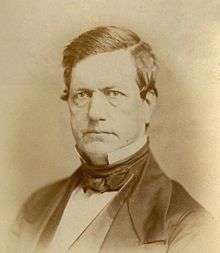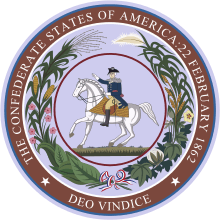John Bullock Clark
John Bullock Clark Sr. (April 17, 1802 – October 29, 1885) was a member of both the United States Congress and the Confederate Congress.
John Clark | |
|---|---|
 | |
| Member of the C.S. House of Representatives from Missouri's 3rd district | |
| In office February 18, 1864 – May 10, 1865 | |
| Preceded by | Caspar Bell |
| Succeeded by | Constituency abolished |
| Confederate States Senator from Missouri | |
| In office February 18, 1862 – February 18, 1864 | |
| Preceded by | Constituency established |
| Succeeded by | George Vest |
| Member of the U.S. House of Representatives from Missouri's 3rd district | |
| In office December 7, 1857 – July 13, 1861 | |
| Preceded by | James Lindley |
| Succeeded by | William Hall |
| Member of the Missouri House of Representatives | |
| In office 1850–1851 | |
| Personal details | |
| Born | April 17, 1802 Madison County, Kentucky, US |
| Died | October 29, 1885 (aged 83) Fayette, Missouri, US |
| Political party | Democratic |
Biography
John B. Clark Sr. was born in Madison County, Kentucky, a nephew of Congressmen Christopher Henderson Clark and James Clark. He attended the country schools, studied law, and was admitted to the bar in 1824. Establishing a law practice in Fayette, Missouri, he served as clerk of the Howard County courts from 1824 until 1834.
Clark was commissioned colonel of Missouri Mounted Volunteers during the Black Hawk War in 1832 and was selected to command Missouri state forces during the Missouri Mormon War. Governor Lilburn Boggs addressed his infamous 1838 Extermination Order 44 to Clark, directing that the Mormons be "exterminated, or driven from the state." He was promoted to major general of the state militia in 1848.
Entering politics, Clark was a member of the State house of representatives in 1850 and 1851. He was appointed as a Democrat to the Thirty-fifth Congress to fill the vacancy caused by the resignation of James S. Green. He was re-elected to the Thirty-sixth and Thirty-seventh Congresses and served from December 7, 1857, until July 13, 1861, when he was expelled for having taken up arms against the Union. He was replaced by William Augustus Hall.
Clark served as a Senator from Missouri in the First Confederate Congress and a Representative in the Second Confederate Congress. He also served in the field as a brigadier general in the Missouri State Guard. Eight days prior to his being expelled from the U.S. Congress, Brigadier General Clark fought at the July 5, 1861 Battle of Carthage.
On November 10, 1865, Major General Philip Sheridan recommended the release of Senator Clark from confinement at Fort Jackson due to poor health.[1]
After the war, he practiced law until his death in Fayette, Missouri. He was buried in Fayette Cemetery.
His son John Bullock Clark Jr. served as a general in the Confederate States Army as well as a postbellum U.S. Congressman.
See also
- List of American Civil War generals (Acting Confederate)
- Extermination order
- List of United States Representatives expelled, censured, or reprimanded
Notes
- Philip, Sheridan. "War of the Rebellion: Serial 121 Page 0794". Ohio State University. Retrieved 10 November 2016.
References
- Allardice, Bruce S. (1995). More Generals in Gray. Baton Rouge, LA: Louisiana State University Press. p. 287. ISBN 978-0-8071-3148-0.
- Eicher, John H.; Eicher, David J. (2001), Civil War High Commands, Stanford, CA: Stanford University Press, ISBN 978-0-8047-3641-1
- Philip, Sheridan. "War of the Rebellion: Serial 121 Page 0794". Ohio State University. Retrieved 10 November 2016.
- United States Congress. "John Bullock Clark (id: C000441)". Biographical Directory of the United States Congress. Retrieved on 2009-04-20
![]()
| Party political offices | ||
|---|---|---|
| Preceded by First |
Whig nominee for Governor of Missouri 1840 |
Succeeded by Charles Allen |
| U.S. House of Representatives | ||
| Preceded by James Lindley |
Member of the U.S. House of Representatives from Missouri's 3rd congressional district 1857–1861 |
Succeeded by William Hall |
| Confederate States Senate | ||
| New constituency | Confederate States Senator (Class 1) from Missouri 1862–1864 Served alongside: Robert Peyton, Waldo Johnson |
Succeeded by George Vest |
| Confederate States House of Representatives | ||
| Preceded by Caspar Bell |
Member of the C.S. House of Representatives from Missouri's 3rd congressional district 1864–1865 |
Constituency abolished |
